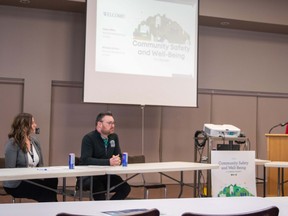Mental health and addictions the focus of Huron awareness campaign


Article content
HURON – An awareness campaign spearheaded by the Huron County Community Safety and Well-Being Plan oversight committee has launched, shedding light on the prominent issue of mental health and addictions.
Advertisement 2
Article content
Article content
Recommended Videos
Article content
This year’s set of campaigns was announced during a Jan. 10 event in Clinton, where the oversight committee spoke about many of the services available to those struggling with addictions and mental health in Huron County, while also overviewing the previous 2024 campaigns.
The 2025 campaigns will continue to focus on the four key issues identified in Huron County’s Community and Safety Well-Being Plan, as they did in 2024: mental health and addictions; housing stability and homelessness; domestic and family violence; and community security.
While speaking in Clinton, committee co-chair and Central Huron Deputy Mayor Marg Anderson highlighted the successes of 2024.
“This committee was very busy in 2024, and I think we accomplished a lot,” she said. “In 2025, we’re going to build on what we accomplished last year.”
Advertisement 3
Article content
Anderson said this year’s first campaign, which runs from January through March, will aim to shift conversations about mental health in a way that will help the community to provide support to those who need it most.
“Good mental health might differ from one person to another, and achieving and maintaining good mental health is not a one-person journey,” said Anderson. “Mental health must be a common theme and priority in every workplace, school and neighbourhood to ensure that individual well-being, as mental health is the lifeblood running through the veins of communities and enables resilience, confidence and connection.”
Rodney Phillips, manager of outpatient mental health for the Huron Perth Healthcare Alliance, said he was “very excited” about the launch of the awareness campaign. He pointed to the alliance’s helpline at 1-888-829-7484 as a resource that’s available to all Huron and Perth County residents experiencing a mental-health crisis.
Advertisement 4
Article content
The helpline is available 24 hours a day, and the alliance’s crisis response team can offer assessments, crisis therapy, education and treatment referrals.
“In my role, I get to work very closely with this team, and I can confidently say that for anyone who calls in, not only do they get a chance to speak with a trained mental-health professional who’s very good at mitigating crises for an individual, but these people lead with kindness, compassion and support to getting that mental health and addiction care that’s needed,” said Phillips.
The Canadian Mental Health Association (CMHA) Huron Perth is one of the many groups offering support through initiatives such as the “In the Know” program, a free four-hour workshop aimed at farmers and those in the agricultural sector, and covers topics such as stress, anxiety, depression and substance use.
Advertisement 5
Article content
“In the Know aims to build mental-health knowledge and increase help-seeking among farmers, hoping that they will engage in seeking help when they need it,” said CMHA Huron Perth CEO Catherine Hardman. “We have staff who are trained in In the Know and have done a number of workshops in the community.”
Lynn Higgs, Huron Health System’s vice-president of clinical services, spoke during the event about how isolation can impact mental health. She said the agricultural sector’s physical and mental challenges expose those working within it to psychosocial hazards that can impact their mental health.
“Studies have increasingly highlighted that farmers are at risk for mental illness and suicide due to stress, isolation, financial pressures and exposure to traumatic events,” she said. “A major factor contributing to poor mental health in farming is the high level of stress. Farmers often work very long hours with little time off and are heavily reliant on factors outside of their control, like weather and market fluctuations.”
Advertisement 6
Article content

Higgs said isolation can also be particularly challenging for farmers since they often work alone or in small teams, leading to “limited social interactions,” and added that cultural expectations can pressure farmers not to seek support.
“As farmers are often expected to be resilient and tough, the stigma surrounding mental-health issues can prevent them from seeking help,” she said. “The culture of toughness sometimes means farmers continue working despite being unwell or emotionally drained, leading to a deterioration in both physical and mental health.”
With 35 per cent of farmers meeting the classification for depression, Higgs highlighted the Gateway Centre of Excellence in Rural Health’s SHED Talks initiative as a local resource available to farmers struggling with their mental health. The centre’s program that started in Huron County connects farmers, providing a space for education and open dialogues.
“The hope is to combat the mental health crisis in agriculture and provide farmers with the necessary supports to maintain both their physical and emotional well-being,” said Higgs.
For more information about the Huron County Community Safety and Well-Being Plan and the mental health and addiction supports available, visit cswbhuron.ca.
Article content
link







:max_bytes(150000):strip_icc()/103922949-56a794633df78cf7729752e7.jpg)